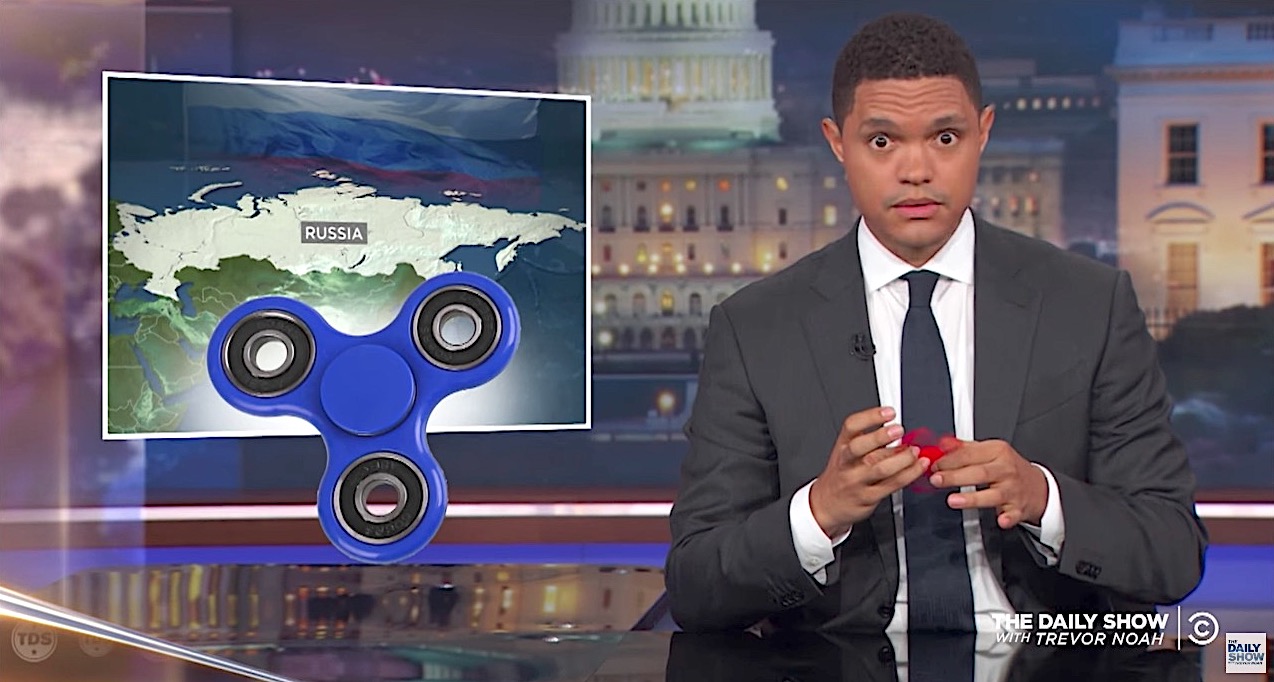Trevor Noah notes that Putin sees U.S. meddling in Russia's presidential election, via fidget spinners


A free daily email with the biggest news stories of the day – and the best features from TheWeek.com
You are now subscribed
Your newsletter sign-up was successful
Russia is holding its own presidential election in nine months, and President Vladimir Putin suspects U.S. interference of the most devious kind, Trevor Noah said on Wednesday's Daily Show: fidget spinners. Because of Putin's fears that fidget spinners are a U.S. ploy to undermine him, "Russia is banning fidget spinners," Noah said. "And just like that, there goes Russia's reputation as a fun country." Putin was apparently tipped off to this nefarious plot when people passed out the faddish gizmos at an anti-Putin rally, he explained, Putin's opponents ran with it, and now, "according to Vladimir Putin, everyone in the world with a fidget spinner opposes him."
"This is genius," Noah said. "Every other resistance movement should do the same thing. You just tie yourself to a popular fad, and make it look like it's bigger than it is." As an example, he suggested that Nelson Mandela should have co-opted Pokeman. "But it turns out, fidget spinners aren't the only thing Russia is toying with," Noah said, leading into President Trump's second, undisclosed meeting with Putin at the G-20 summit. He said he just didn't understand why Trump, under investigation for colluding with Russia, would have a private conversation with the president of Russia.
"Maybe this is our fault," Noah said. "Maybe we've been parenting Trump the wrong way. Because clearly, if we tell him to stay away from that bad boy Vlad, we're going to push him right into his arms." He elaborated, then pointed out the salient point that Putin himself mischievously hinted at: Trump is an open book, and Russia's good a reading. "Right now, the best we can hope for is that Trump is so full of B.S. that he's too unreliable to be spied on," he said. Watch below. Peter Weber
The Week
Escape your echo chamber. Get the facts behind the news, plus analysis from multiple perspectives.

Sign up for The Week's Free Newsletters
From our morning news briefing to a weekly Good News Newsletter, get the best of The Week delivered directly to your inbox.
From our morning news briefing to a weekly Good News Newsletter, get the best of The Week delivered directly to your inbox.
A free daily email with the biggest news stories of the day – and the best features from TheWeek.com
Peter has worked as a news and culture writer and editor at The Week since the site's launch in 2008. He covers politics, world affairs, religion and cultural currents. His journalism career began as a copy editor at a financial newswire and has included editorial positions at The New York Times Magazine, Facts on File, and Oregon State University.
-
 How the FCC’s ‘equal time’ rule works
How the FCC’s ‘equal time’ rule worksIn the Spotlight The law is at the heart of the Colbert-CBS conflict
-
 What is the endgame in the DHS shutdown?
What is the endgame in the DHS shutdown?Today’s Big Question Democrats want to rein in ICE’s immigration crackdown
-
 ‘Poor time management isn’t just an inconvenience’
‘Poor time management isn’t just an inconvenience’Instant Opinion Opinion, comment and editorials of the day
-
 ‘One Battle After Another’ wins Critics Choice honors
‘One Battle After Another’ wins Critics Choice honorsSpeed Read Paul Thomas Anderson’s latest film, which stars Leonardo DiCaprio, won best picture at the 31st Critics Choice Awards
-
 Son arrested over killing of Rob and Michele Reiner
Son arrested over killing of Rob and Michele ReinerSpeed Read Nick, the 32-year-old son of Hollywood director Rob Reiner, has been booked for the murder of his parents
-
 Rob Reiner, wife dead in ‘apparent homicide’
Rob Reiner, wife dead in ‘apparent homicide’speed read The Reiners, found in their Los Angeles home, ‘had injuries consistent with being stabbed’
-
 Hungary’s Krasznahorkai wins Nobel for literature
Hungary’s Krasznahorkai wins Nobel for literatureSpeed Read László Krasznahorkai is the author of acclaimed novels like ‘The Melancholy of Resistance’ and ‘Satantango’
-
 Primatologist Jane Goodall dies at 91
Primatologist Jane Goodall dies at 91Speed Read She rose to fame following her groundbreaking field research with chimpanzees
-
 Florida erases rainbow crosswalk at Pulse nightclub
Florida erases rainbow crosswalk at Pulse nightclubSpeed Read The colorful crosswalk was outside the former LGBTQ nightclub where 49 people were killed in a 2016 shooting
-
 Trump says Smithsonian too focused on slavery's ills
Trump says Smithsonian too focused on slavery's illsSpeed Read The president would prefer the museum to highlight 'success,' 'brightness' and 'the future'
-
 Trump to host Kennedy Honors for Kiss, Stallone
Trump to host Kennedy Honors for Kiss, StalloneSpeed Read Actor Sylvester Stallone and the glam-rock band Kiss were among those named as this year's inductees
